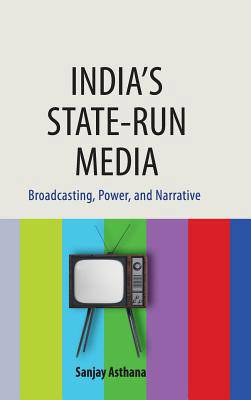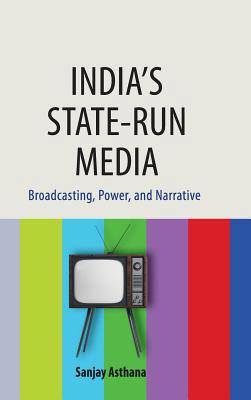
Bedankt voor het vertrouwen het afgelopen jaar! Om jou te bedanken bieden we GRATIS verzending (in België) aan op alles gedurende de hele maand januari.
- Afhalen na 1 uur in een winkel met voorraad
- In januari gratis thuislevering in België
- Ruim aanbod met 7 miljoen producten
Bedankt voor het vertrouwen het afgelopen jaar! Om jou te bedanken bieden we GRATIS verzending (in België) aan op alles gedurende de hele maand januari.
- Afhalen na 1 uur in een winkel met voorraad
- In januari gratis thuislevering in België
- Ruim aanbod met 7 miljoen producten
Zoeken
€ 152,95
+ 305 punten
Omschrijving
India's State-run Media presents a new perspective on broadcasting by bringing together two neglected areas of research in media studies in India - the intertwined genealogies of sovereignty, public, religion, and nation in radio and television, and the spatiotemporal dynamics of broadcasting into a single analytic inquiry. It argues that the spatiotemporalities of broadcasting and the inter-relationships among the public, religion, and nation can be traced to an organizing concept that shaped India's late colonial and postcolonial histories - sovereignty. The book contends that studies of television have glossed over the meanings, experiences, and practices of the religious in televisual narratives and viewers' interpretations of television programs. Drawing on the philosophical writings of Paul Ricoeur and Michel Foucault, connecting their ideas with media, cultural, and religious studies, it examines cultural discourses, power relations, repertoire of meanings, social events, etc. in broadcasting in late colonial and postcolonial India.
Specificaties
Betrokkenen
- Auteur(s):
- Uitgeverij:
Inhoud
- Aantal bladzijden:
- 220
- Taal:
- Engels
Eigenschappen
- Productcode (EAN):
- 9781108481700
- Verschijningsdatum:
- 9/05/2019
- Uitvoering:
- Hardcover
- Formaat:
- Genaaid
- Afmetingen:
- 211 mm x 236 mm
- Gewicht:
- 362 g

Alleen bij Standaard Boekhandel
+ 305 punten op je klantenkaart van Standaard Boekhandel
Beoordelingen
We publiceren alleen reviews die voldoen aan de voorwaarden voor reviews. Bekijk onze voorwaarden voor reviews.









